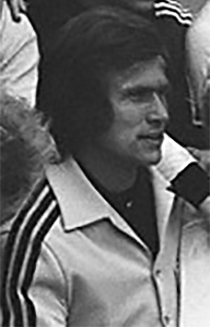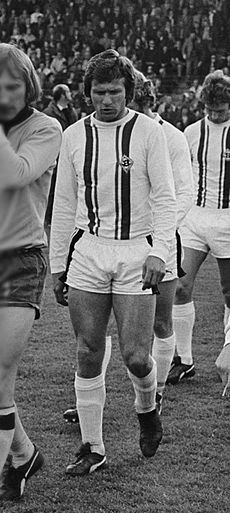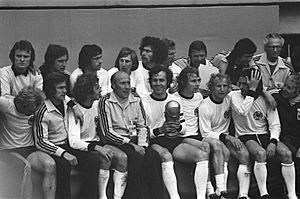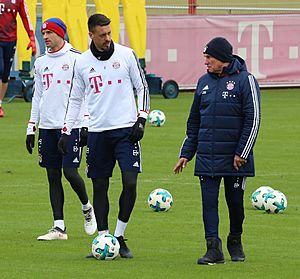Jupp Heynckes facts for kids
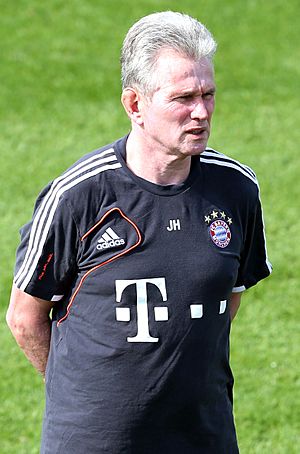
Heynckes with Bayern Munich in 2013
|
||||||||||||||||||||||
| Personal information | ||||||||||||||||||||||
|---|---|---|---|---|---|---|---|---|---|---|---|---|---|---|---|---|---|---|---|---|---|---|
| Full name | Josef Heynckes | |||||||||||||||||||||
| Date of birth | 9 May 1945 | |||||||||||||||||||||
| Place of birth | Mönchengladbach, Germany | |||||||||||||||||||||
| Height | 1.80 m (5 ft 11 in) | |||||||||||||||||||||
| Position(s) | Forward | |||||||||||||||||||||
| Youth career | ||||||||||||||||||||||
| 1956–1962 | Grün-Weiß Holt | |||||||||||||||||||||
| 1962–1964 | Borussia Mönchengladbach | |||||||||||||||||||||
| Senior career* | ||||||||||||||||||||||
| Years | Team | Apps | (Gls) | |||||||||||||||||||
| 1963–1967 | Borussia Mönchengladbach | 82 | (50) | |||||||||||||||||||
| 1967–1970 | Hannover 96 | 112 | (41) | |||||||||||||||||||
| 1970–1978 | Borussia Mönchengladbach | 226 | (168) | |||||||||||||||||||
| Total | 420 | (259) | ||||||||||||||||||||
| International career | ||||||||||||||||||||||
| 1966–1967 | West Germany U23 | 3 | (1) | |||||||||||||||||||
| 1967–1976 | West Germany | 39 | (14) | |||||||||||||||||||
| Managerial career | ||||||||||||||||||||||
| 1979–1987 | Borussia Mönchengladbach | |||||||||||||||||||||
| 1987–1991 | Bayern Munich | |||||||||||||||||||||
| 1992–1994 | Athletic Bilbao | |||||||||||||||||||||
| 1994–1995 | Eintracht Frankfurt | |||||||||||||||||||||
| 1995–1997 | Tenerife | |||||||||||||||||||||
| 1997–1998 | Real Madrid | |||||||||||||||||||||
| 1999–2000 | Benfica | |||||||||||||||||||||
| 2001–2003 | Athletic Bilbao | |||||||||||||||||||||
| 2003–2004 | Schalke 04 | |||||||||||||||||||||
| 2006–2007 | Borussia Mönchengladbach | |||||||||||||||||||||
| 2009 | Bayern Munich (caretaker) | |||||||||||||||||||||
| 2009–2011 | Bayer Leverkusen | |||||||||||||||||||||
| 2011–2013 | Bayern Munich | |||||||||||||||||||||
| 2017–2018 | Bayern Munich | |||||||||||||||||||||
|
Medal record
|
||||||||||||||||||||||
| *Club domestic league appearances and goals | ||||||||||||||||||||||
Josef "Jupp" Heynckes is a famous German former footballer and manager. He was born on May 9, 1945. Most of his playing career was spent as a striker for Borussia Mönchengladbach. This was during their "golden era" in the 1960s and 1970s.
With Mönchengladbach, he won many national championships and the DFB-Pokal (German Cup). He also won the UEFA Cup. He is the fourth-highest goalscorer in the history of the Bundesliga, with 220 goals. Jupp Heynckes was also part of the West Germany national team. They won the UEFA Euro 1972 and the 1974 FIFA World Cup titles.
As a manager, Heynckes won four Bundesliga titles with Bayern Munich. He also won two UEFA Champions League titles. One was with Real Madrid in 1998 and the other with Bayern in 2013. The 2013 win was part of a "continental treble," meaning they won three major trophies in one season. Many people think he is one of the greatest football managers ever.
Contents
Playing Career Highlights
Playing for Clubs
Jupp Heynckes played 369 matches in the German Bundesliga. He scored 220 goals, which is the fourth-highest total in the league's history. Only Gerd Müller, Robert Lewandowski, and Klaus Fischer scored more.
He started his professional career in 1964 with his hometown club, Borussia Mönchengladbach. They were in the second division at the time. In 1965, his team was promoted to the Bundesliga. Heynckes scored 23 goals in 25 matches in his first season.
In 1967, he joined Hannover 96 and played there for three years. He scored 25 goals in 86 league matches. He returned to Mönchengladbach in 1970. The club had just won its first league title. With Heynckes, who scored 19 goals, Gladbach became the first club to win the Bundesliga title two years in a row in 1971.
In 1973, Borussia Mönchengladbach reached the final of the UEFA Cup. They lost to Liverpool. Heynckes scored both goals in Gladbach's 2–0 win in the second leg. He was also a top scorer in the competition with 12 goals. Despite this, Gladbach won the DFB-Pokal (German Cup) that season.
In the 1973–74 season, Heynckes was the joint top goalscorer in the Bundesliga with 30 goals. In 1975, Gladbach won their third Bundesliga title. Heynckes was the top goalscorer again with 27 goals. The club also won its first European trophy, the UEFA Cup. Heynckes scored a hat-trick in the final away game. This made Gladbach the first German team to win the UEFA Cup.
Borussia Mönchengladbach continued to win the Bundesliga in 1976 and 1977. In 1977, they reached their first European Cup final. They lost to Liverpool again. Heynckes scored 18 goals in the 1977–78 Bundesliga season. This included five goals in a huge 12–0 win against Borussia Dortmund.
Heynckes finished his playing career in 1978. He then started studying to become a coach. During his club career, he won four Bundesliga titles, one DFB-Pokal, and one UEFA Cup. He is Borussia Mönchengladbach's top goalscorer in the Bundesliga with 195 goals.
Playing for West Germany
Heynckes played 39 times for the West Germany national team. He scored 14 goals. He made his international debut in February 1967, scoring in a 5–1 win against Morocco.
Heynckes was part of the West Germany team that won the 1972 UEFA European Championship. He played the full 90 minutes in the 3–0 final win against the Soviet Union. He was also chosen for the official "Team of the Tournament."
He was in West Germany's squad for the 1974 FIFA World Cup, which they hosted. Even though he was playing well for his club, he spent most of the tournament on the bench. This was because Gerd Müller, the team's top scorer, was the main striker. Heynckes started the first two games but then got injured. West Germany went on to win their second World Cup. Heynckes later said that missing the final due to injury was "the greatest disappointment of my life."
Managerial Career Highlights
Early Coaching Years (1979–1991)
Borussia Mönchengladbach Manager
After retiring as a player, Heynckes became a manager. He started at Borussia Mönchengladbach in 1979, taking over from Udo Lattek. He was only 34 years old. In his first season, 1979–80, he led Mönchengladbach to the UEFA Cup final. They lost to Eintracht Frankfurt.
During his time there, Mönchengladbach often finished in the top half of the Bundesliga. They also reached the DFB-Pokal final in 1984, but lost to Bayern Munich on penalties. In 1986, they had a memorable UEFA Cup match against Real Madrid. They won the first leg 5–1, but lost the second leg 4–0. This meant they were knocked out because of the away goals rule. Heynckes called it "the worst night of my career."
Even though he didn't win a trophy as manager for his hometown club, he was known for building strong teams. He left Mönchengladbach in 1987.
Bayern Munich Manager (First Time)
Heynckes became manager of Bayern Munich in 1987. In his first season, Bayern won the DFB-Supercup. Bayern then won back-to-back Bundesliga titles in 1989 and 1990. They also reached the semi-finals of the European Cup three times in a row (1989, 1990, 1991). Each time, they were knocked out by the team that went on to win the competition.
Heynckes was fired by Bayern in October 1991. This happened after the team had a slow start to the season. Years later, Bayern's general manager Uli Hoeneß said that sacking Heynckes was "the biggest mistake of my career."
Coaching in Spain and Germany (1992–1998)
Athletic Bilbao and Eintracht Frankfurt
In 1992, Heynckes moved to Spain to manage Athletic Bilbao. He helped them finish fifth in the league in 1994, which meant they qualified for the UEFA Cup.
He returned to Germany in 1994 to manage Eintracht Frankfurt. This was a difficult time for him. He had disagreements with some of the team's star players. He left the club in April 1995.
Tenerife and Real Madrid
Heynckes went back to Spain in 1995 to coach Tenerife. In his first season, he led them to fifth place in La Liga, qualifying for the UEFA Cup. They also reached the semi-finals of the UEFA Cup in 1997.
In June 1997, Heynckes was hired by Real Madrid. He won the Spanish Super Cup with them. His biggest success came when Madrid beat Juventus 1–0 in the 1998 UEFA Champions League Final. This was Real Madrid's first European Cup win since 1966. However, because the team didn't do as well in the Spanish league, he was let go at the end of the season.
Later Coaching Roles (1999–2007)
Benfica and Second Time at Athletic Bilbao
After leaving Real Madrid, Heynckes took a break. In 1999, he joined Portuguese club Benfica. He stayed for one full season, finishing third in the league. He left Benfica in September 2000.
In 2001, Heynckes returned to Athletic Bilbao for a second time. He led them to tenth place in 2002 and seventh place in 2003 in La Liga. He left Athletic in June 2003.
Schalke 04 and Second Time at Borussia Mönchengladbach
In 2003, Heynckes came back to Germany to manage Schalke 04. He said Schalke was "something special." Despite his hopes, the team finished seventh in the Bundesliga in 2004. He was fired in September 2004 after a poor start to the new season.
In May 2006, Heynckes returned to manage Borussia Mönchengladbach for a second time. The team started well, but then went 14 league matches without a win. He resigned in January 2007. He even refused a pay-off and cleaned his company car before returning it. Mönchengladbach was later relegated that season.
Final Years in Management (2009–2018)
Caretaker at Bayern Munich
After two years away from football, Heynckes came back in April 2009. He became a temporary manager for Bayern Munich after their coach was sacked. Bayern was in danger of not qualifying for the Champions League. Heynckes helped the team win four of their last five matches. They finished second in the Bundesliga.
Bayer Leverkusen Manager
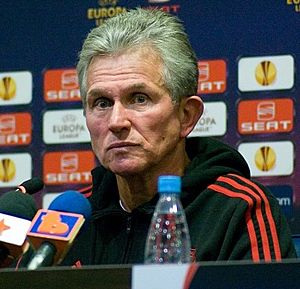
In June 2009, Heynckes signed a two-year contract to manage Bayer Leverkusen. The team had a record-breaking start to the 2009–10 season, going 24 Bundesliga matches unbeaten. They challenged Bayern Munich for the league title. In the 2010–11 season, Leverkusen finished second in the Bundesliga. This meant they qualified for the Champions League for the first time since 2005. Despite his success, Heynckes decided to leave Leverkusen in 2011.
Third and Fourth Times at Bayern Munich
Heynckes took over at Bayern Munich for a third time in July 2011. At 66, he was the oldest coach in the Bundesliga. In the 2011–12 season, Bayern finished second in the Bundesliga and lost the German Cup final. They also reached the 2012 Champions League Final, which was played in their home stadium. However, they lost to Chelsea on penalties. This meant Bayern finished as runners-up in all three major competitions that season.
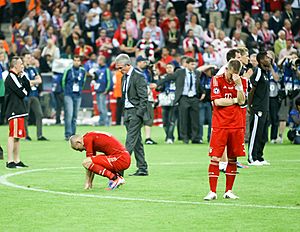
The 2012–13 season was incredibly successful. Bayern started by winning the DFL-Supercup against Borussia Dortmund. They then had a record-breaking Bundesliga campaign. They won the league title on April 6, 2013, earlier than any team before. Bayern broke many records that season, including most points (91) and fewest goals conceded (18).
In the Champions League, Bayern beat Barcelona 7–0 over two games in the semi-finals. In the final, Heynckes' Bayern defeated rivals Borussia Dortmund 2–1. This made him one of only four managers to win the Champions League with two different clubs. On June 1, 2013, Heynckes managed Bayern for the last time in the German Cup final. Bayern won 3–2, becoming the first German club to win the "treble" (league, domestic cup, and European Cup). Many people, including Franz Beckenbauer, called this Bayern team "the best Bayern team ever."
Heynckes won the FIFA World Coach of the Year award for 2013. He announced he would not coach a team in the 2013–14 season. He said he was ready for "peace and quiet" after his successes.
On October 6, 2017, Heynckes returned to manage Bayern Munich for a fourth time. He was appointed until the end of the 2017–18 season. His first match was a 5–0 win. In April 2018, Heynckes set a new Champions League record. He achieved 12 consecutive wins as a manager. Bayern won the Bundesliga title again under him in 2018.
Heynckes retired at the end of the 2017–18 season. He managed 1,265 matches in total across different competitions and leagues.
Honours and Awards
As a Player
Borussia Mönchengladbach
- Bundesliga: 1970–71, 1974–75, 1975–76, 1976–77
- DFB-Pokal: 1972–73
- UEFA Cup: 1974–75 (Runner-up: 1972–73)
- European Cup Runner-up: 1976–77
West Germany National Team
- FIFA World Cup: 1974
- UEFA European Football Championship: 1972
Individual Player Awards
- Bundesliga top scorer: 1973–74, 1974–75
- European Cup top scorer: 1975–76
- UEFA Cup top scorer: 1972–73, 1974–75
- UEFA European Championship Team of the Tournament: 1972
As a Manager
Borussia Mönchengladbach (as an assistant coach)
- UEFA Cup: 1978–79
Bayern Munich
- Bundesliga: 1988–89, 1989–90, 2012–13, 2017–18
- DFB-Pokal: 2012–13
- DFL-Supercup: 1987, 1990, 2012
- UEFA Champions League: 2012–13 (Runner-up: 2011–12)
Real Madrid
- UEFA Champions League: 1997–98
- Supercopa de España: 1997
Schalke 04
- UEFA Intertoto Cup: 2003, 2004
Individual Manager Awards
- FIFA World Coach of the Year: 2013
- IFFHS World's Best Club Coach: 2013
- German Football Manager of the Year: 2013, 2018
- World Soccer Awards Manager of the Year: 2013
See also
 In Spanish: Jupp Heynckes para niños
In Spanish: Jupp Heynckes para niños
 | Janet Taylor Pickett |
 | Synthia Saint James |
 | Howardena Pindell |
 | Faith Ringgold |


